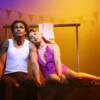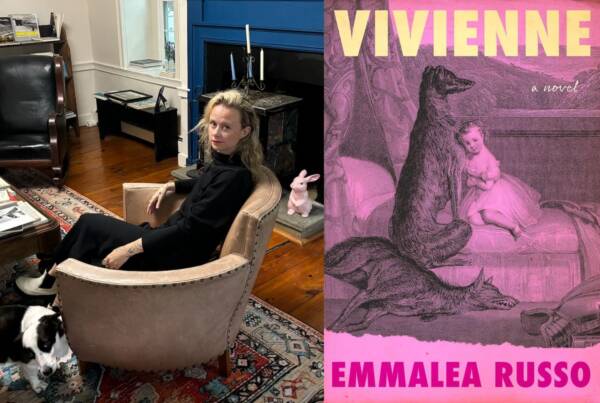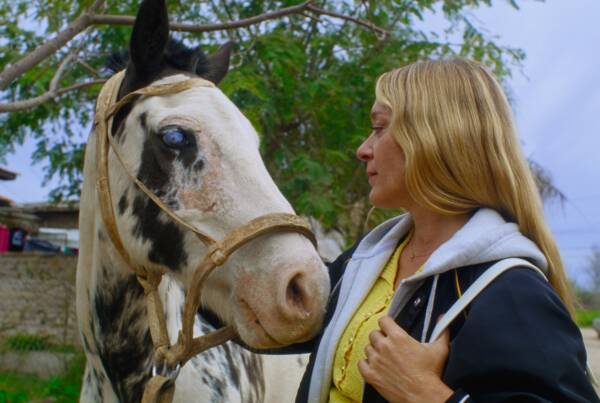Interview by Eliza Hull // photograph by Mrs. Redhead
Sometimes an artist can get under your skin, and recently, Susan O’Neill from Ireland has done just that. Now, when her music plays in the background while I’m making dinner or driving, I get goosebumps. She’s not just an artist you can listen to passively, though. Since newly discovering her music through a friend, I’ve been listening to her a lot, often lying on my bed with headphones on, completely immersed in her ability to simultaneously break and mend my heart.
With a voice reminiscent of Regina Spektor and Florence Welch, she has the ability to cut right through. Her lyrics are poetic and profound, as if they were written just for me. When you listen, I promise you’ll feel the same way.
Fortunately for us, she has just announced a brand-new record, Now in a Minute, coming out in September, along with a new single, Sign of the Times. Susan’s solo album follows her 2021 collaboration album In The Game with acclaimed Irish songwriter Mick Flannery, which became the best-selling independent album in Ireland that year. I recently had the pleasure of catching up with Susan online over a cup of tea to discuss how music entered her life, its impact on her through her schooling years, and the importance of infusing joy and friendship into music-making—without ego—for it to truly feel meaningful.
How did music come into your life?
I’m very grateful that my parents encouraged me to play music. They knew I had a lot of excess energy and needed an outlet. When I started learning music, I noticed how different notes made me feel in different ways. Some notes clashed, while others harmonised. At eleven or twelve, I became very aware of dissonance and harmony.
What early records inspired you?
Growing up, my parents listened to the radio a lot. My dad had records I wasn’t allowed to touch, like The Beatles and Simon & Garfunkel. My mum was into country music, old Irish songs, and classical music. I was introduced to Mozart, Bach, and Beethoven through CDs that were just lying around. They were incredibly riveting to me, and I didn’t really have anyone to share it with, I didn’t think to check with anybody at school, is anyone else listening to this? But it really moved me.
How did these records influence your own music-making?
I learned that music could change your mood and state of mind. From a young age, I felt this deeply because the records of my parents were just lying around. I discovered them on my own. The same happened when I started playing the trumpet in extracurricular activities. Teachers encouraged us to make friends with our instruments and explore them in our own way. That’s how music became a friend to me. Nobody was telling me what to do or not do with it.
What was early school life like for you?
At school, I had difficulty learning, though not in a way that it was never diagnosable. I had a lot of trouble focusing, so school was very tough. I had nice friends and teachers, but it didn’t take from the fundamental struggle. Music became my guide and teacher. I really do believe that without it I would have been very lost. With music, it’s okay to be completely lost or suspended to somewhere that you don’t really know where you are going, there’s purpose to not knowing where you are with music. Without it, I would have been in a very difficult situation, because, if you’re a kid struggling in school and you don’t have anywhere for those pains and gains to be expressed, then where else does it go?
How was the process of creating your new album Now in a Minute? It sounds like a slight stylistic shift—was that intentional?
I reconnected with friends from college who play jazz, and we wrote new songs together in my home in the West of Ireland. We didn’t put any guidelines on it at all. By natural flow, I think I veer towards always trying something new. I want to push myself. I used to sing in a techno band and collaborated and sang with Mick Flannery, who is a national treasure of Irish music. I love all genres; I want to explore them and see what it will show me about even my own attitude towards music. It’s a beautiful challenge, I think it’s important to change, but it wasn’t a deliberate shift.
In terms of the producing, I also wanted to have a hand in semi producing this record, but I also worked with people that I knew from over the years. One or two of the tracks were done in a remote situation. The beautiful thing is that everyone on the record had the art and the creativity in the perfect place, that was our focus, there was no ego. With all the people I work with, all the musicians, producers, we share, we are open hearted, and it needs to be like this, so that the best art is what is important in the end, and that is what gets it through. All the people I have surrounded myself with, they’re egoless, everything is for the music. We will do whatever it takes for that. When you’re surrounded by these kinds of people, it’s just this rising tide, it feels more conducive to a better thing being made.
What is the single Sign of the Times about?
Sign of the times is really about gentrification. And the idea that these things are kind of happening at a very swift pace, in a blink of an eye. It’s also slightly nodding to the danger of I suppose pacifying something, using our words to kind of numb or pat down something that really ought to be shouted about. We can be good at saying ‘That is life.’ Looking around at the human race, we have evolved really beautifully, we have done phenomenal things with medicine, common things where people would of died just 50 years ago, are now cured by a tablet, that’s amazing, however we need to apply the brakes here and here, and I’m not saying I know where those places are, though as a human I feel I should exercise my right to say somethings are just wrong, and need to be changed.
Susan O’Neill’s record Now in a Minute is out in September, and the single Sign of the Times is available now. Susan plans to tour Australia in January 2025.







